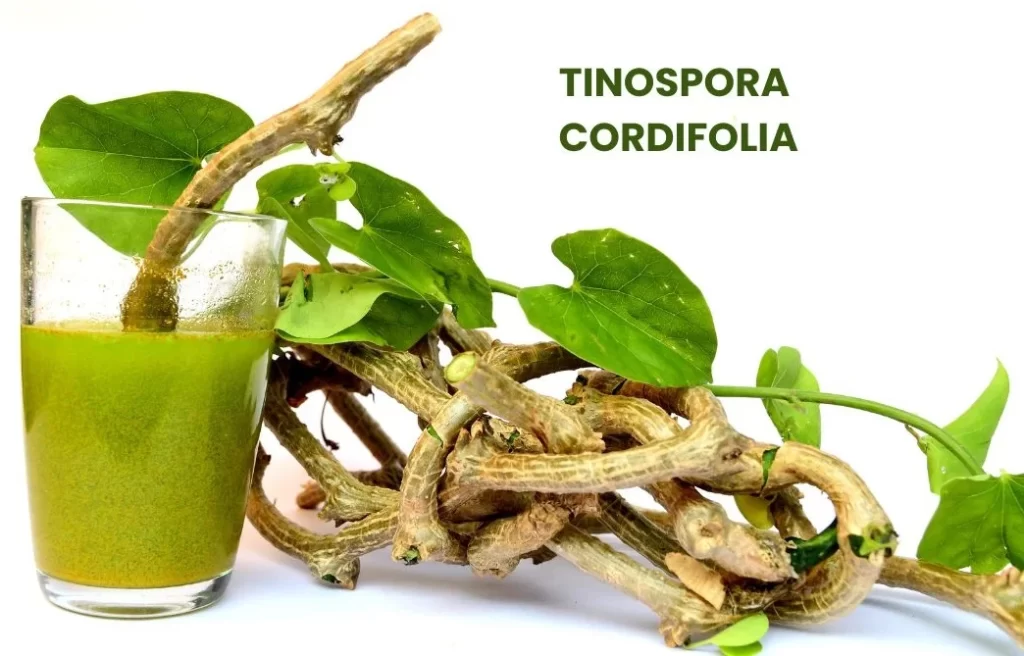Tinospora cordifolia, commonly known as Gulancha or Heart-leaved Moonseed, is a climbing shrub belonging to the family Menispermaceae.
It is renowned in traditional medicine for its wide range of therapeutic applications, including treatment of fevers, jaundice, rheumatism, and various skin diseases.
This medicinal plant is revered for its adaptogenic and immunomodulatory properties, making it a vital component in Ayurveda.

Table of Contents
ToggleSOURCE INFORMATION
Commonly known as,
Ninjara, Guluchee, Guruchi, Kodi, Tippa-tige, Guluchi ; Amritvel, Heart-leaved, Moon-seed.
Gilo, Gularich, Gulwali, Gharol, Gula-veli, Shindil
Scientific Classification
- Kingdom: Plantae
- Clade: Angiosperms
- Clade: Eudicots
- Order: Ranunculales
- Family: Menispermaceae
- Genus: Tinospora
- Species: T. cordifolia
Origin and Historical Facts
- Tinospora cordifolia is native to tropical regions of India, Myanmar, and Sri Lanka.
- It has been used for centuries in Ayurveda, the traditional Indian system of medicine, where it is known as “Amritvel,” meaning “the root of immortality.”
- Historical texts describe its use in treating a variety of ailments, including chronic fevers, liver disorders, and infections.
- The plant is often found growing in deciduous and dry forests and is characterized by its heart-shaped leaves and fleshy stem.
DRUG PATHOGENESIS
- Tinospora cordifolia exhibits a range of pharmacological actions, including antipyretic (fever-reducing), anti-inflammatory, and immunomodulatory effects.
- It acts by enhancing the body’s immune response and promoting the removal of toxins.
- Its constituents, such as alkaloids, diterpenoid lactones, glycosides, steroids, and polysaccharides, contribute to its wide therapeutic profile.
KEY CHARACTERISTICS
- Immunomodulatory: Enhances immune system function.
- Antipyretic: Reduces fever.
- Anti-inflammatory: Reduces inflammation.
- Adaptogenic: Helps the body adapt to stress.
- Hepatoprotective: Protects the liver.
DETAILED ORGAN SYMPTOMS
FEVER
- Acute or Chronic Malarial Fever: Characterized by afternoon temperature spikes accompanied by chills and shivering, bilious vomiting, thirst, and headache.
- Chronic Slow Fever: Often linked with a history of gonorrhoea and weakness due to seminal loss.
- Bad Effect of Quinine: Continuation of fever with burning sensation in hands and face, and jaundice.
URINARY SYSTEM
- Frequent Urination: Small quantities of urine with a burning sensation during urination.
- Pus in Urine: Urine mixed with pus indicating an infection.
HEART
- Palpitation: Excessive and noticeable heartbeats.
MODALITIES
- Aggravation: Symptoms worsen in the afternoon and with the intake of quinine.
- Amelioration: Improvement with rest and cooling measures.
WHAT ARE MODALITIES IN HOMOEOPATHY?
RELATIONSHIP WITH OTHER DRUGS
- Compare with: Quinine (for its effects on fever), Bryonia, Nux vomica (for its action on the digestive system).
DOSE
- Mother tincture: 10-15 drops, 2-3 times daily.
- 2x potency: 3-5 drops, 2-3 times daily.
- 3x potency: 3-5 drops, 2-3 times daily.
- 6x potency: 3-5 drops, 2-3 times daily.
Frequently Asked Questions
What is Tinospora cordifolia used for?
- Tinospora cordifolia is used for treating fevers, jaundice, rheumatism, skin diseases, secondary syphilis, and genito-urinary problems such as gonorrhea and dysuria.
How does Tinospora cordifolia help in fevers?
- It acts as an antipyretic, reducing fever by enhancing the immune response and promoting the removal of toxins.
Can Tinospora cordifolia be used for urinary infections?
- Yes, it helps in managing urinary infections characterized by frequent urination and burning sensations.
What is the recommended dosage for chronic conditions?
- For chronic conditions, the potencies of 2x, 3x, and 6x are recommended, depending on the severity and specific symptoms.
Glossary of Difficult Words
- Adaptogenic: Substances that help the body adapt to stress and exert a normalizing effect upon bodily processes.
- Antipyretic: A substance that reduces fever.
- Hepatoprotective: Substances that prevent damage to the liver.
- Immunomodulatory: Capable of modifying or regulating one or more immune functions.
- Pharmacological: Relating to the branch of medicine concerned with the uses, effects, and modes of action of drugs.
This detailed drug picture provides a comprehensive overview of Tinospora cordifolia, its medicinal properties, and therapeutic applications.
If you have any further questions or need additional information, feel free to ask!
